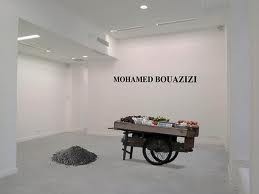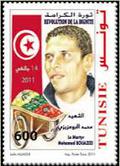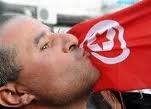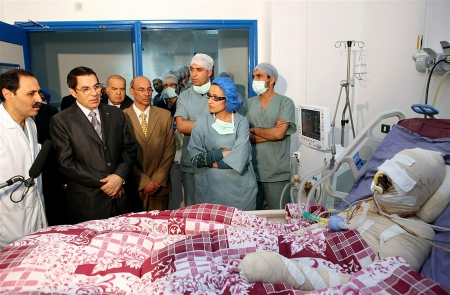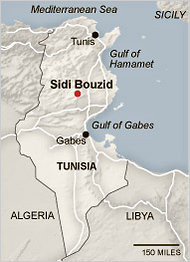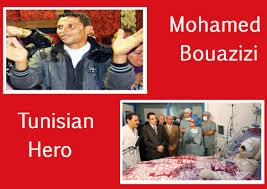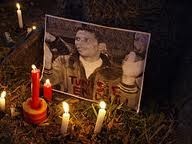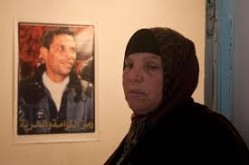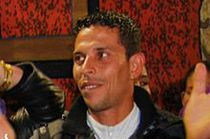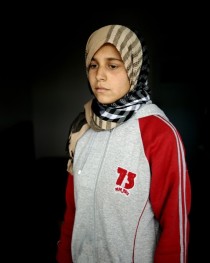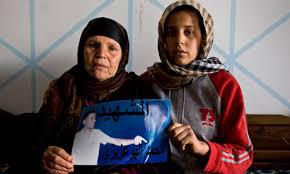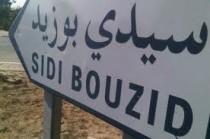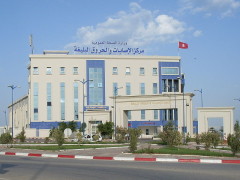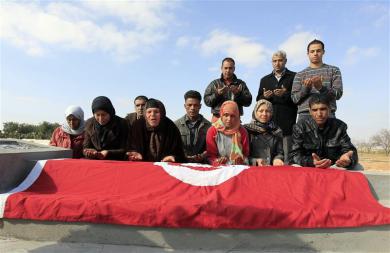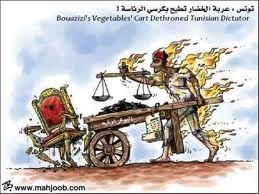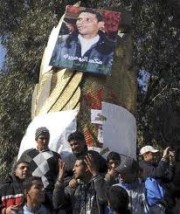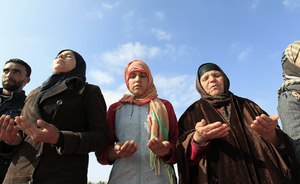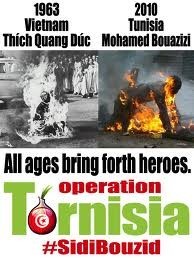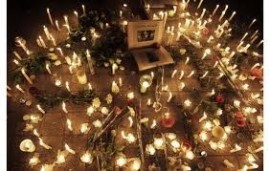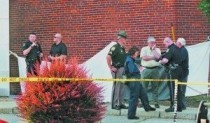Mohamed Bouazizi: March 29, 1984 - January 4, 2011
How a slap sparked Tunisia's revolution
How a slap sparked Tunisia's revolution
CBS News, 60 Minutes
February 20, 2011
On the morning of Dec. 17, 26-yr.-old Mohamed Bouazizi was selling fruit from a cart as he did every day to support his family. He didn't have a
license. But very few of the vendors did.
A municipal official, a woman, came by and confiscated his scale. It was worth $100 and Bouazizi knew he'd have to pay a bribe to get it back. This had happened to him before. But this time, he got
mad. He complained and the woman slapped him. One slap in the face, and that's how the revolution began. He ran, screaming, to the government office in the center of town. He wanted his scale back.
That's all. But they wouldn't let him in. He went to a gas station, filled up a canister and went back to the government building. His friend Jamil, another fruit vendor, went with him. Jamil says
Bouazizi stood in the middle of traffic, poured gas over himself and cried out, "How do you expect me to make a living?" Then he lit a match. He barely survived.
Tunisia was ruled by a corrupt and ruthless dictator named Zine Ben Ali, who filled his prisons with anyone who spoke out against him. Sidi Bouzid, a town of 40,000, doesn't get so much as a mention
in the Tunisian guidebooks. Tourists don't come to the town. Read
more
60 Minutes How a slap sparked Tunisia's revolution
Tunisian Republic on Wikipedia
al-Jumhuriyya at-Tunisiyya
République tunisienne
Remarks by the President on the Middle East & North Africa
THE PRESIDENT: That story of self-determination began six months ago in Tunisia. On December 17th, a young vendor named Mohammed Bouazizi was devastated when a police officer confiscated his cart. This was not unique. It’s the same kind of humiliation that takes place every day in many parts of the world -– the relentless tyranny of governments that deny their citizens dignity.
Only this time, something different happened. After local officials refused to hear his complaints, this young man, who had never been particularly active in politics, went to the headquarters of the provincial government, doused himself in fuel, and lit himself on fire.
There are times in the course of history when the actions of ordinary citizens spark movements for change because they speak to a longing for freedom that has been
building up for years. In America, think of the defiance of those patriots in Boston who refused to pay taxes to a King, or the dignity of Rosa Parks as she sat courageously in her seat.
So it was in Tunisia, as that vendor’s act of desperation tapped into the frustration felt throughout the country. Hundreds of protesters took to the streets, then thousands. And in the
face of batons and sometimes bullets, they refused to go home –- day after day, week after week -- until a dictator of more than two decades finally left power. read more
..................Arabs brandishing people power...................
Arabs brandishing people power
Joblessness, corruption provoke protests from Tunisia to Egypt
By Ashish Kumar Sen
The Washington Times
Monday, January 31, 2011
Economic grievances, including high levels of unemployment and rampant corruption, have been a key driver of protests erupting across the Arab world in recent weeks.
However, since the ouster of longtime Tunisian President Zine el-Abidine Ben Ali on Jan. 14, protesters have grown emboldened by the realization that they have the power to bring about real
change. On Monday, Egyptian President Hosni Mubarak dismissed his despised interior minister and appointed a new finance minister in a Cabinet reshuffle that analysts say will do little to save his
embattled regime.
In a sign that protesters will accept nothing short of the 82-year-old Mr. Mubarak's ouster, the opposition called for a "march of millions" and a general strike on Tuesday.
"It's too late now," Shadi Hamid, director of research at the Brookings Institution's center in Doha, Qatar, said of Mr. Mubarak's efforts. "The protesters aren't talking about economics. We're not
hearing chants about bread or subsidies," Mr. Hamid said in a phone interview.
Economic grievances were the spark for protests in Tunisia, where Mohammed Bouazizi, a 26-yearold street vendor, set himself of fire in December after an altercation with police. Read more
Arabs brandishing people power, The Wash[...]
Adobe Acrobat document [42.1 KB]
Mohamed Bouazizi, the fruit vendor whose death may have changed the Arab world
Slap to a Man’s Pride Set Off Tumult in Tunisia
Slap to a Man’s Pride Set Off Tumult in Tunisia
By KAREEM FAHIM
January 21, 2011
The New York Times
SIDI BOUZID, Tunisia — Mohamed Bouazizi spent his whole life on a dusty, narrow street here, in a tiny, three-room house with a concrete patio where his mother hung the laundry and the red chilis to
dry. By the time Mr. Bouazizi was 26, his work as a fruit vendor had earned him just enough money to feed his mother, uncle and five brothers and sisters at home. He dreamed about owning a van.
Faida Hamdy, a 45-year-old municipal inspector in Sidi Bouzid, a police officer’s daughter, was single, had a "strong personality" and an unblemished record, her supervisor said. She inspected
buildings, investigated noise complaints and fined vendors like Mr. Bouazizi, whose itinerant trade may or may not have been legal; no one seems to know.
On the morning of Dec. 17, when other vendors say Ms. Hamdy tried to confiscate Mr. Bouazizi’s fruit, and then slapped him in the face for trying to yank back his apples, he became the hero — now the
martyred hero — and she became the villain in a remarkable swirl of events in which Tunisians have risen up to topple a 23-year dictatorship and march on, demanding radical change in their
government.
The revolution has rippled beyond Tunisia, shaking other authoritarian Arab states, whose frustrated young people are often written off as complacent when faced with
stifling bureaucracy and an impenetrable and intimidating security apparatus. That assumption was badly shaken with Mr. Bouazizi’s reaction to his slap, and now a picture of him, in a black jacket
with a wry smile, has become the revolution’s icon.
In a series of interviews, the other fruit vendors, officials and family members described the seemingly routine confrontation that had set off a revolution. They
said that Mr. Bouazizi, embarrassed and angry, had wrestled with Ms. Hamdy and was beaten by two of her colleagues, who also took his electronic scale. He walked a few blocks to the municipal
building, demanded his property, and was beaten again, they said. Then he walked to the governor’s office, demanded an audience and was refused.
"She humiliated him," said his sister, Samia Bouazizi. "Everyone was watching." Sometime around noon, in the two-lane street in front of the governor’s high gate, the vendor drenched himself in paint
thinner then lit himself on fire. A doctor at the hospital where he was treated said the burns covered 90 percent of his body.
The protests in Sidi Bouzid were small at first, starting soon after the fire seared Mr. Bouazizi’s clothes to his body and burned off his lips. Today, the city is transformed... The inspectors in
Sidi Bouzid now wear street clothes, too frightened to wear the blue overcoats with the epaulets and the stripes... Ms. Hamdy, arrested on orders from the now-deposed president himself, is in jail in
another town...Read more
Slap to a Man’s Pride Set Off Tumult in [...]
Adobe Acrobat document [51.0 KB]
How a man setting fire to himself sparked an uprising in Tunisia
by Brian Whitake
guardian.co.uk
28 December 2010
Watching events in Tunisia over the past few days, I have been increasingly reminded of an event in 1989: the fall of the Romanian dictator, Nicolae Ceausescu. Is the Tunisian dictator, Zine El
Abidine Ben Ali, about to meet a similar fate?
After 22 years in power, Ceausescu's end came suddenly and somewhat unexpectedly. It began when the government harassed an ethnic Hungarian priest over something he had said. Demonstrations broke out
but the priest was soon forgotten: they rapidly turned into generalised protests against the Ceausescu regime. The Romanian public, to put it mildly, had had enough.
The riots and demonstrations that have swept through Tunisia during the past 10 days also began with a small incident. Twenty-six-year-old Mohamed Bouazizi, living in the provincial town of Sidi
Bouzid, had a university degree but no work. To earn some money he took to selling fruit and vegetables in the street without a licence. When the authorities stopped him and confiscated his produce,
he was so angry that he set himself on fire.
Rioting followed and security forces sealed off the town. On Wednesday, another jobless young man in Sidi Bouzid climbed an electricity pole, shouted "no for misery, no for unemployment", then
touched the wires and electrocuted himself. Read more
How a man setting fire to himself sparke[...]
Adobe Acrobat document [103.2 KB]
Mohamed Bouazizi
Wikipedia
Mohamed Bouazizi (March 29, 1984 - January 4, 2011) was a Tunisian street vendor who set himself on fire on December 17, 2010, in protest of the confiscation of his wares and the harassment and
humiliation that was allegedly inflicted on him by a municipal official and her aides. This act became the catalyst for the 2010–2011 Tunisian revolution, sparking deadly demonstrations and riots
throughout Tunisia in protest of social and political issues in the country. Anger and violence intensified following Bouazizi's death, leading then-President Zine El Abidine Ben Ali to step down on
January 14, 2011, after 23 years in power.
The success of the Tunisian protests sparked protests in several other Arab countries, including several men who emulated Bouazizi's act, in an attempt to bring an end to the oppression they face
from corrupt autocratic governments. Those men and Bouazizi are hailed by some as "heroic martyrs of a new Middle Eastern revolution." As a result, concessions have also been made in Algeria,
Bahrain, Egypt, Jordan, Libya, and Yemen, with the most significant taking place on February 11, 2011, when Hosni Mubarak resigned, ending his 30-year reign as the president of Egypt.
Mohamed Bouazizi
Early life and employment struggles
Wikipedia
Mohamed Bouazizi, who was known locally as Basboosa, was born in Sidi Bouzid, Tunisia, on March 29, 1984. His father, a construction worker in Libya, died of a heart
attack when Bouazizi was three, and his mother married Bouazizi's uncle some time later. Along with his six siblings, Bouazizi was educated in a one-room country school in a village named Sidi Salah.
Although multiple media outlets reported that Bouazizi had a university degree, his sister, Samia Bouazizi, stated that he had never graduated from high school, but that it was something he had
wanted for both himself and his sisters. With his uncle in poor health and unable to work regularly, Bouazizi had worked various jobs since he was ten, and in his late teens he quit school in order
to work full-time.
Bouazizi lived in a modest stucco home, a twenty-minute walk from the center of Sidi Bouzid, a rural town in Tunisia burdened by corruption and suffering an unemployment rate estimated at 30%.
According to his mother, he applied to join the army, but was refused, and several subsequent job applications also resulted in rejection. He supported his mother, uncle, and younger siblings,
including paying for one of his sisters to attend university, by earning approximately US$140 per month selling his produce on the street in Sidi Bouzid. He was also working toward the goal of buying
a work van, according to his sister Samia. Read more
Mohamed Bouazizi
Confiscation of wares and self-immolation
Wikipedia
Local police officers had targeted Bouazizi for years, even during his childhood, regularly confiscating his small wheelbarrow of produce; but Bouazizi had few
options to try to make a living, so he continued to work as a street vendor. On the morning of December 17, 2010, he had contracted approximately US$200 in debt to buy his merchandise. Soon after
setting up his cart, the police confiscated his wares again, ostensibly because Bouazizi did not have a vendor's permit. However, while some sources state that street vending is illegal in Tunisia,
and others that Bouazizi lacked a required permit to sell his wares, according to the head of Sidi Bouzid's state office for employment and independent work, no permit is needed to sell from a
cart.
It has also been claimed that Bouazizi did not have the funds to bribe police officials to allow his street vending to continue. Similarly, two of Bouazizi's siblings accused authorities of
attempting to extort money from their brother, and during an interview with Reuters, one of his sisters stated, "What kind of repression do you imagine it takes for a young man to do this? A man who
has to feed his family by buying goods on credit when they fine him ... and take his goods. In Sidi Bouzid, those with no connections and no money for bribes are humiliated and insulted and not
allowed to live."
Regardless, Bouazizi's family claims he was publicly humiliated when a 45-year-old female municipal official, Faida Hamdi, slapped him in the face, spat at him, confiscated his electronic weighing
scales, and tossed aside his fruit and vegetable cart. It was also stated that she made a slur against his deceased father. Her gender made his humiliation worse due to mores in the Arab world.
Bouazizi's mother claimed Hamdi's aides also beat and swore at her son. Countering these claims, in an interview with Asharq Al-Awsat, a brother of Hamdi claimed neither his sister nor her aides
slapped or otherwise mistreated Bouazizi. He said they only confiscated Bouazizi's wares. However, an eye witness told Asharq Al-Awsat that he did not see Hamdi slap Bouazizi, but that her aides did
beat him.
Bouazizi, angered by the confrontation, went to the governor's office to complain. Following the governor's refusal to see or listen to him, even after Bouazizi was quoted as saying "'If you don't
see me, I'll burn myself'", he acquired a can of gasoline (or two bottles of paint thinner) and, at 11:30 a.m. local time (less than an hour after the altercation), he doused himself in front of a
local government building and set himself alight. Read more
Mohamed Bouazizi
Wikipedia
According to the Bouazizi family lawyer, Bouazizi was taken by ambulance to a medical facility in Sidi Bouzid. When they were not able to treat Bouazizi's severe
burns, he was taken to the city
of Sfax, more than 70 miles away. Later, as the government's interest in his case grew, he was transferred to a hospital in the town of Ben Arous at the Burn and Trauma Centre, where he was visited
by then-President Zine El Abidine Ben Ali. He died there, eighteen days after the immolation, on January 4, 2011, at 5:30 p.m. local time.
It is estimated that more than 5,000 people participated in the funeral procession that began in Sidi Bouzid and continued through to Bouazizi's native village, though police did not allow
the procession to pass near the spot at which Bouazizi had burned himself. From the crowd, many were heard chanting "Farewell, Mohammed, we will avenge you. We weep for you today. We will make those
who caused your death weep." He was buried at Garaat Bennour cemetery, 10 miles from Sidi Bouzid.
On February 4, 2011, Bertrand Delanoë the mayor of Paris announced that, as a tribute to honour Bouazizi, a place in Paris will be named after him. Read more
The family of Mohamed Bouazizi pray and mourn at his grave in the Tunisian town of Sidi Bouzid January 19, 2011. Bouazizi, a vegetable seller, set himself on fire on December 17, igniting nationwide protests that eventually forced the president to flee the country. Friday, March 25, 2011, REUTERS/Zohra Bensemra
Mohamed Bouazizi
Wikipedia
An investigation was launched following Bouazizi's self-immolation to determine what took place during the incident that led to his action. On December 20, 2010, it
was reported that Faida Hamdi, the female officer who allegedly accosted Bouazizi the day of his immolation, was suspended along with the secretary-general (governor) of Sidi Bouzid, but this was
subsequently denied by the secretarygeneral of the Sidi Bouzid municipality. Some time later, Hamdi was arrested on orders from then- President Ben Ali and held in an unspecified town. A brother of
Hamdi later stated that she had been arrested and detained on two separate occasions, the first time following Ben Ali's visit to Bouazizi in the hospital and subsequent meeting with his mother and
sister at his presidential palace. He says his sister and her aides were released following a short detention and the closing of the investigation which "confirmed her innocence". He said her second
arrest was "in response to the demands of the Tunisian protestors", and that the Tunisian security authorities informed him that she was being held only for her own protection and would be released
once the protesting ended.
According to Bouazizi's mother, who was not aware of her son's intentions before he carried out his act of self-immolation, he did what he did because he had been humiliated, not because of the
family's poverty. "It got to him deep inside, it hurt his pride", she said, referring to the police harassment. One of Bouazizi's sisters stated during an interview with Asharq Al-Awsat that their
family intends to take legal action against all involved, "whether this is the municipal officers that slapped and insulted him, or the mayor [who] refused to meet him." Read more
...........Mohamed Bouazizi awarded Sakharov Prize........
Sakharov Prize for Freedom of Thought 2011
Mohamed Bouazizi was posthumously awarded the Sakharov Prize along with four other representatives of the Arab people, in recognition & support of their drive for freedom and human rights.
Sakharov Prize for Freedom of Thought 20[...]
Adobe Acrobat document [163.5 KB]
Sakharov Prize - Wikipedia, the free enc[...]
Adobe Acrobat document [181.3 KB]
Mohamed Bouazizi
Wikipedia
Outraged by the events that led to Bouazizi's self-immolation, protests began in Sidi Bouzid, building for more than two weeks, with attempts by police to quiet the unrest serving only to fuel what had become a violent and deadly movement. After Bouazizi's death, the protests became widespread, moving into the more affluent areas and eventually into the capital. The anger and violence became so intense that President Ben Ali fled Tunisia with his family on January 14, 2011, trying first to go to Paris, but was refused refuge by the French government. They were eventually welcomed into Saudi Arabia under many conditions, ending his 23-year dictatorship and sparking "angry condemnation" among Saudis. In Tunisia, unrest persisted as a new regime took over, leaving many citizens of Tunisia feeling as though their needs were still being ignored. Read more
How Mohammed Bouazizi Sparked a Revoluti[...]
Adobe Acrobat document [37.8 KB]
Mohamed Bouazizi
Wikipedia
Since Bouazizi's self-immolation led to the successful overthrow of the Ben Ali regime, a number of self -immolation protests emulating Bouazizi's have taken place in other Arab countries. In Algeria, Mohsen Bouterfif set himself on fire after a meeting with a town mayor failed in helping him find employment and housing on January 13, 2011. He later died of his wounds. Another Algerian man attempted but failed to burn himself. In Egypt, Abdou Abdel-Moneim Jaafar, a 49-year-old restaurant owner, set himself alight in front of the Egyptian Parliament. His act of protest contributed to the instigation of weeks of protest and, later, the resignation of Egyptian then-President Hosni Mubarak on February 11, 2011. In Saudi Arabia, an unidentified 65-year-old man died on January 21, 2011, after setting himself on fire in the town of Samtah, Jizan. This was apparently the kingdom's first known case of self-immolation.
The wave of copycat incidents finally reached Europe on February 11, 2011, when a young Moroccan street seller, Noureddine 'Franco' Adnane, set himself on fire in the
city of Palermo, Sicily, in protest of the confiscation of his wares and the harassment that was allegedly inflicted on him by municipal officials. Noureddine Adnane, father of three, holder of a
working permit and allegedly correctly licensed, died the next day
Although these self-immolation cases have not provoked the same kind of popular reaction that Bouazizi's death did in Tunisia, the Algerian, Egyptian, Yemeni, and Jordanian governments have
experienced significant protests and made major concessions in response to them. As such, these men and Bouazizi are being hailed by some as "heroic martyrs of a new Arab revolution."
Read more
Mohamed Bouazizi - Wikipedia, the free e[...]
Adobe Acrobat document [252.7 KB]
List of political self-immolations
Self-immolation in America
Thomas James Ball self-immolated, could not pay child support. Hardley anyone in America noticed
"I have 21 years of Army service going back to the Vietnam War. My loyalty to the government should be a given. It is gone. I am certain it will never return regardless
of how long I might have lived." - Thomas James Ball in his "last statement" before he self-immolated in front of the courthouse that was integral in destroying his life. Read more
Thomas James Ball Self-Immolated in Prot[...]
Adobe Acrobat document [390.4 KB]
Business Insider: New Hampshire man lights
himself on fire to protest America’s decline
Simon Black
June 20, 2011
Late last week, Thomas James Ball reached his breaking point. Driven to desperation by a system that bankrupted him and destroyed his family, Ball walked up to the
main door of the Keene County, New Hampshire courthouse, doused himself with gasoline, and lit himself ablaze.
Hardly anyone seems to have noticed.
Conversely, when a 26-year old Tunisian man lit himself on fire a few months ago after police confiscated the fruits and vegetables he had been selling without a proper
permit, it launched a wave of revolution across the Middle East.
People were shocked into taking action… protests and riots swept the region and one regime after another crumbled.
Rather than sparking an "American spring" and shocking US citizens into taking their country back, though, Mr. Ball’s act of self-immolation seems to have been largely
ignored. There has been scant coverage (and scant is being extremely generous) of Mr. Ball in the mainstream media, and what little coverage there is generally discredits the man as a
troublemaker.
This is how the system’s gatekeepers have been so adroit at maintaining the status quo– by suppressing dissent, marginalizing the detractors, and distracting the
populace with meaningless, irrelevant drivel.
Mr. Ball left behind a lengthy missive prior to his suicide, which covers a range of topics from political corruption to why the family court system in America is
utterly disgraceful. He was, to put it mildly, a staunch advocate of violent change, and it’s clear he hoped a great deal of others would follow in his footsteps to literally burn the system
down.
(Ball even left instructions for how to make a proper Molotov cocktail along with specific vulnerabilities of police stations in his area…)
Perhaps the most interesting part of his final post, however, was the observation that the United States is no longer a nation of laws; Ball described what he calls the
‘second set of books,’ which is essentially the collection of policies, procedures, and protocols that courts and executive agencies rely upon.
This includes police departments and other ‘enforcers’ across the country that come up with standardized responses to take judgment out of the equation. TSA agents, for
instance, are only following procedure when they fondle children at airport checkpoints. Even the guys who drove the trains to the concentration camps were just following procedures.
Ball argued that the nation is now ruled by such procedures, even in such institutions as family court where judges (by policy) pass the buck down the line to mental
health case workers.
His anger and desperation for this system, which tore apart his family and bankrupted his finances, led Ball to light himself ablaze at the local courthouse in a state
whose motto is "Live Free or Die." Ball chose the latter.
The next day, life went on in America. There was no shocking front-page cover story or award-winning photograph to spark a national debate… let alone propel droves of
fed-up citizens to flood the streets demanding change.
Rather, the New Hampshire courthouse cleaned up his charred remains and meticulously scrubbed the floors to eliminate all trace of the event. 24-hour news networks ran a
quick blurb in their scrolling tickers amid more important coverage of the Miss USA beauty pageant and President Obama’s Father’s Day plans.
In other words, business as usual… suggesting that if there is, in fact, going to be a fight for the soul of the country, it’s a long way off, and many more degrees for
the boiling frogs who are stuck in the pot.
My assessment of this situation, however controversial it may be, remains very clear: the great faceless enemy that opposes us, irrespective of our country of origin, is
the institution of government.
Over time, this institution has inserted itself into nearly all aspects of life, such that a man cannot so much as enjoy a pint of beer, discipline his children, ride on
the train, go to the doctor, open a bank account, apply for a job, go fishing, or watch a sporting event without the heavy hand of government being involved.
This is a beast that feeds on citizens; the more it feeds, the larger it becomes and the hungrier it gets. Of all the solutions out there, including armed conflict,
civil disobedience, self-immolation, active democracy, etc., the only one that truly destroys the beast is starving it– take away the feast of productive citizens and accelerate its
collapse.
New Hampshire man lights himself on fire[...]
Adobe Acrobat document [44.7 KB]
Rev. Charles Moore, 79, self-immolation June 23, 2014
Retired pastor saw ‘destiny’ in self-immolation
By Sam Hodges
July 2, 2014 | DALLAS (UMNS)
United Methodist News Service
A retired United Methodist pastor fatally set himself on fire in a shopping center parking lot in his hometown of Grand Saline, Texas, on June 23.
His death was a final act of protest against social injustice, according to family members and the notes the pastor left behind.
The Rev. Charles R. Moore, 79, lived in Allen, Texas, near Dallas, but apparently drove himself to Grand Saline, in east Texas, on June 23.
At about 5:30 p.m., he parked his car and walked to the parking lot, where he doused himself with gasoline and started the blaze, said Chief Larry Compton of the Grand
Saline police.
Initially, Moore survived, thanks to bystanders who retrieved a store fire extinguisher and put out the blaze.
He was taken by helicopter to Parkland Hospital in Dallas, and died there late that night, Compton said.
Moore was a longtime elder in the Southwest Texas Annual (regional) Conference, where in addition to serving churches he advocated for the abolition of the death penalty
and for gay rights within The United Methodist Church.
No indication toward suicide
Family members said he clearly remained deeply concerned about those issues and others, including race relations, but gave no indication that he was contemplating
suicide in any form. more
The United Methodist Church
Retired pastor saw ‘destiny’ in self-imm[...]
Adobe Acrobat document [81.7 KB]

